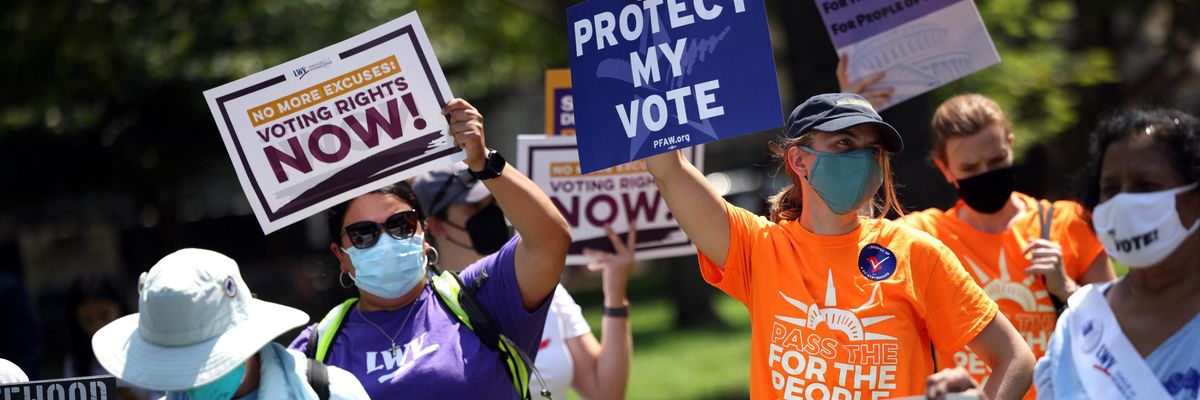In a year that began with the promise of a new direction for our country, few things have been more disheartening than the eruption of voter suppression laws in Republican-led states. These laws gut the voting rights that Black and brown voters fought and died to secure.
We battled them state by state, in a grim version of Whac-a-Mole. Now we need Washington to step in and do its part. Finally, we have a new bill in Congress: the Freedom to Vote Act.
The effort to roll back voting rights is unconscionable, and the federal government has a duty to act. The Freedom to Vote Act is the right law at the right time.
This bill must pass. And it must pass now, because states are already preparing for the 2022 elections.
The Freedom to Vote Act was introduced in the Senate as the successor to the For the People Act, which was shot down twice by Republican filibusters. The new act, which has the support of all 50 Democrats in the Senate, is sometimes described as a "compromise bill," but let's be clear: The bill is no compromise when it comes to essential protections for voting rights.
This is strong legislation that can undo the worst of the voter suppression measures GOP-led states have passed. It expands access to voting by mail, creates automatic voter registration, makes Election Day a federal holiday, and expands early voting.
These are all measures that make voting more accessible to working people with inflexible job schedules, child care responsibilities, or disabilities.
Significantly, the bill aims to counteract insidious new state laws that empower state officials to override local election authorities--and possibly even election results. Imagine if sympathetic state officials had this power when Donald Trump demanded that Georgia "find" him 11,780 votes.
The bill also includes important disclosure provisions to help keep billionaires from secretly buying elections, as well as measures that prohibit the discriminatory and partisan gerrymandering that undermines the principle of one person, one vote.
These measures should appeal to all Americans, because everyone should want a level playing field in our elections. But unfortunately, Republican Senate leader Mitch McConnell has already made it clear that no member of his caucus will vote for this bill.
McConnell also claimed that among the voting restrictions being passed in states, "Not one is designed to suppress the vote based on race."
This is laughable, but also infuriating. As pastors of Black churches, we had no doubts about their intent when Texas and Georgia politicians attacked our Souls to the Polls tradition by trying to cut Sunday voting hours.
This all leads to an inescapable conclusion: Voting rights advocates in Congress must go it alone to protect those rights if necessary, and they must eliminate any procedural obstacles that stand in the way.
In the Senate, that means the filibuster.
Senators Joe Manchin (D-WV), a chief architect of the Freedom to Vote Act, and Kyrsten Sinema (D-AZ) have resisted reforming or removing the filibuster. President Joe Biden is said to be coming around on filibuster reform, but has not yet turned his words into action.
The time for clinging to the filibuster as a tradition is over. You cannot simultaneously be for voting rights and for allowing procedural rules to stand in the way of legislation that protects those rights.
The real choice is simple: The Senate and the House must pass the Freedom to Vote Act, and the president must sign it.
It's what the American people want: Public support for voting rights legislation is strong and crosses party lines, politicians' rhetoric aside. The effort to roll back voting rights is unconscionable, and the federal government has a duty to act. The Freedom to Vote Act is the right law at the right time.
And time is running out.
